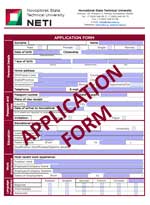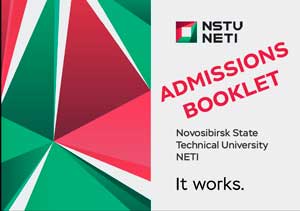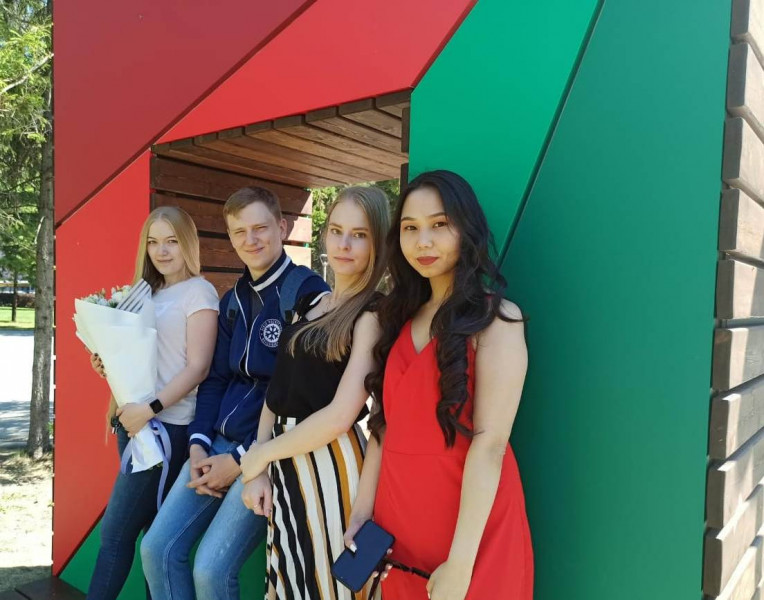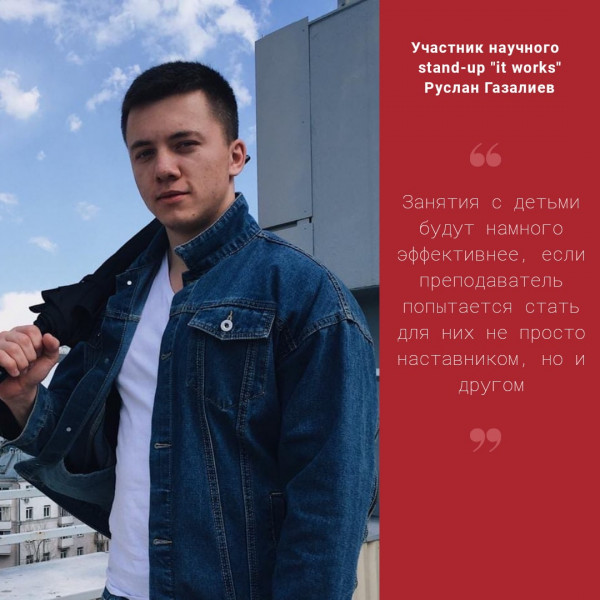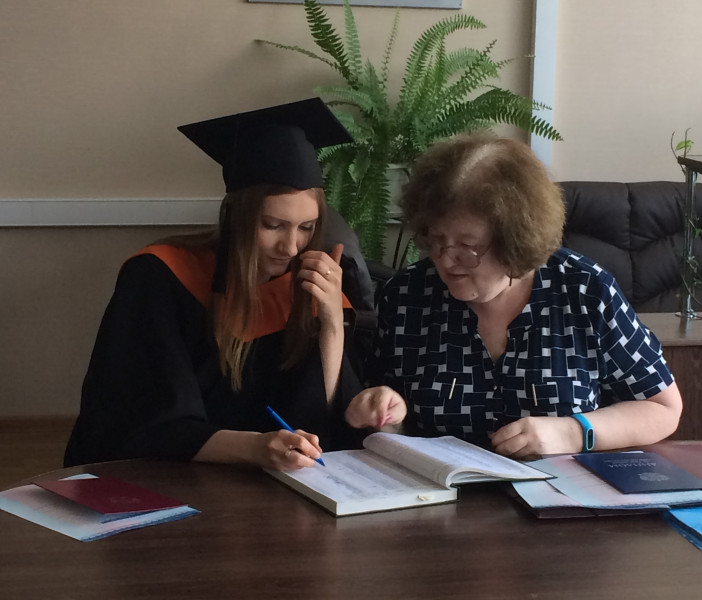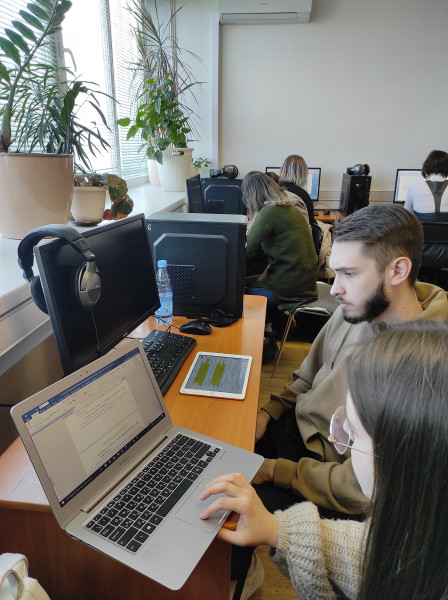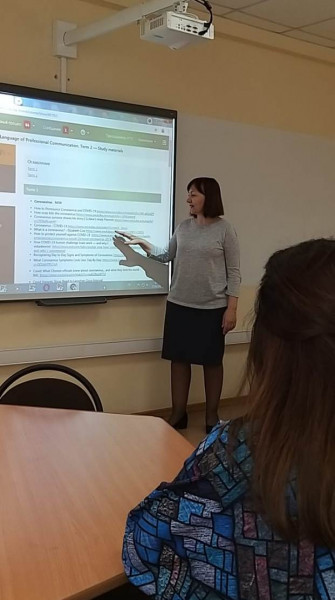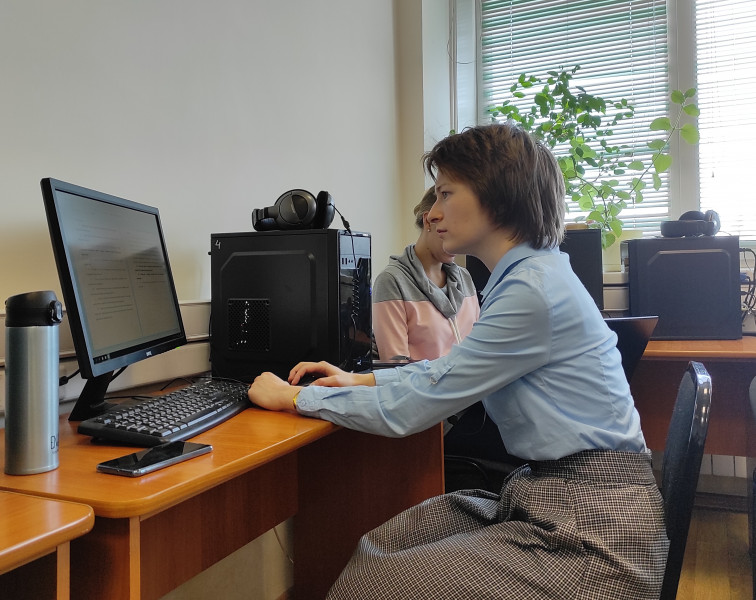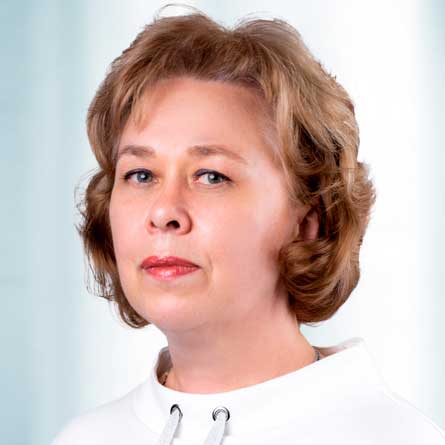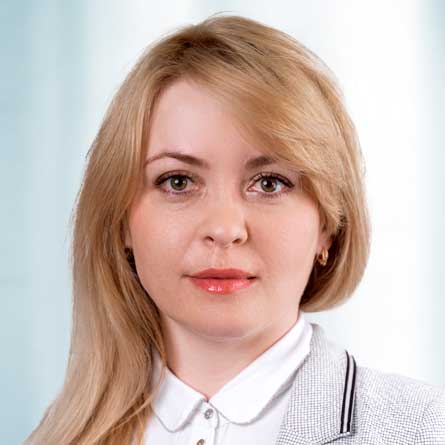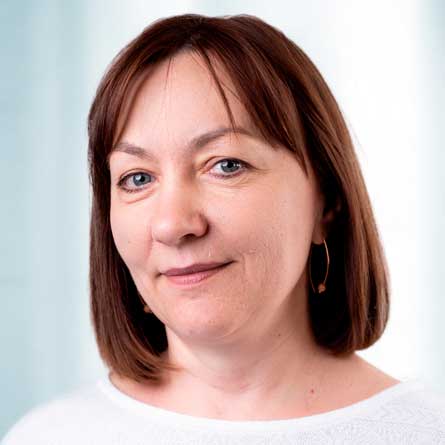Tuition fee information for all majors
Humanities
Duration: 2 years
Start: September 1
Admission: open
Language : English
The master program "Teaching Foreign Languages in Digital Environments" (in English) trains teachers who are able to teach foreign languages on the basis of modern digital technologies, which meets the needs of the modern society. The close-to the-real English-speaking environment created by the teaching staff in English helps master students to improve their level of proficiency in professionally-oriented English.
The program is designed on the basis of the master program "Teaching a Foreign language" (in Russian) implemented at NSTU NETI since 2012, and in accordance with the need to improve pre-service teacher training skills in creating digital environments for teaching foreign languages.
-
Master students focus on
- doing research in teaching foreign languages,
- presenting results of the research at conferences and in publications both in Russian and English,
- mastering professional competencies in planning and managing foreign language classroom in digital environments,
- gaining experience in teaching foreign languages at the university.
The program is aimed to provide all graduates with the knowledge and skills for careers in the field of teaching foreign languages with the use of digital technologies or for post-graduate studies. You will spend substantial time on gaining hands-on experience in language teaching methodology as well as on doing educational research.
- Bachelor's degree.
- Minimum level of English proficiency – B2+/C1
| Course: Modern Problems of Science and Language Education | ||
| Professor | Elena A. Melekhina | |
| Recommended semester | 1 | |
| Requirements | Fundamentals of Pedagogy | |
| Form of Teaching | Practice, course paper research, self-study | |
| ECTS | 3 | |
| Form of Assessment | Test | |
| Content of Teaching |
Current trends in educational research Globalization and internationalization of education Humanism and learner-centeredness Digitalization and e-learning in education Language education development |
|
| Learning Outcomes, Qualification and Competence Aims | Modern Problems of Science and Language Education is a one-semester course focused on the analyses of urgent problems of education in general and language education, in particular. It aims to prepare students for consolidating knowledge of pedagogy to formulate the statement of master’s program research. | |
| Course: History and Methodology of Pedagogical Research | ||
| Professor | Elena A. Melekhina | |
| Recommended semester | 1 | |
| Requirements | Previous research for bachelor qualification paper | |
| Form of Teaching | Lectures, interim assessment, self-study | |
| ECTS | 4 | |
| Form of Assessment | Test | |
| Content of Teaching |
Research Methods Stages of Research Work Data Collection Interpretation of Research Findings |
|
| Learning Outcomes, Qualification and Competence Aims | Methodology and Methods of Pedagogical Research is a one-semester course aimed at enhancing learners’ competence as educational researchers. By the end of the course the learners are supposed to be ready to define the goals and objectives of research, formulate hypothesis, define research methods and plan experimental work. | |
| Course: English for Professional Purposes | ||
| Professor | Irina A. Kazachikhina | |
| Recommended semester | 1, 2, 3 | |
| Requirements | English for Specific Purposes in Foreign Language Teaching | |
| Form of Teaching | Seminars, self-study | |
| ECTS | 12 | |
| Form of Assessment | Exam, test, exam | |
| Content of Teaching |
General English (natural, real-world grammar and vocabulary in social, professional, and academic settings) Academic writing: different types of essays and a research manuscript English for Specific Purposes in Modern Approaches to Foreign Language Teaching |
|
| Learning Outcomes, Qualification and Competence Aims | By the end of the course students will be able to produce texts of different research genres; to communicate in real situations and real language; to socialise in English in professionally-oriented situations. | |
| Course: Educational Psychology | ||
| Professor | Anton V. Tarakanov | |
| Recommended semester | 1 | |
| Requirements | Fundamentals of Psychology and Pedagogy | |
| Form of Teaching | Lectures, seminars, interim assessment, synopsis writing, self-study | |
| ECTS | 3 | |
| Form of Assessment | Exam | |
| Content of Teaching |
Educational psychology as the applied branch of psychology Major branches of psychology Cognitive development of learners and factors involved in learning The Learning Process The Learning Situation |
|
| Learning Outcomes, Qualification and Competence Aims | By the end of the course students will become aware of the psychological issues concerned with human education and learning; get acquainted with major branches of psychology; try to apply the principles and techniques of psychology in the classroom to study the behavior and experiences of the learners. | |
| Course: Theory of Language | ||
| Professor | Marina V. Vlavatskaya | |
| Recommended semester | 1 | |
| Requirements | Fundamentals of Linguistics | |
| Form of Teaching | Lectures, seminars, interim assessment, self-study | |
| ECTS | 6 | |
| Form of Assessment | Examination | |
| Content of Teaching |
Modelling English History of language English vocabulary English grammar Spoken and written English Using English Learning about English |
|
| Learning Outcomes, Qualification and Competence Aims | Theory of Language is a one-semester course that introduces students to the relationships between the different aspects of the study of language; the origins of English; the nature and source of the lexicon; the structure of words and sentences; the sound and written system; varieties of discourse, regional, social and individual variations; learning English as a mother tongue and new ways of studying English. | |
| Course: Didactic Theories in the History of Education | ||
| Professor | Elena A. Melekhina | |
| Recommended semester | 2 | |
| Requirements | Fundamentals of Pedagogy | |
| Form of Teaching | Lectures, interim assessment, synopsis writing, self-study | |
| ECTS | 4 | |
| Form of Assessment | Exam | |
| Content of Teaching |
Didactics as a Theory of Teaching Didactics in Ancient Greece and Rome Didactics in the Age of Enlightenment Didactic Theories at the Turn of the XX Century Education in the XX Century |
|
| Learning Outcomes, Qualification and Competence Aims | The course introduces students to the key didactic theories which significantly influenced education from ancient to modern times. By the end of the course the students should be able to define key concepts of didactics; use specialized terminology; demonstrate knowledge of the didactics development over the major periods in world history and analyze didactic theories and apply their principles to teaching practice and research. | |
| Course: Theory of Language Acquisition | ||
| Professor | Irina A. Kazachikhina | |
| Recommended semester | 1 | |
| Requirements | Foreign Language Teaching | |
| Form of Teaching | Seminars, self-study | |
| ECTS | 3 | |
| Form of Assessment | Test | |
| Content of Teaching |
Theories of language acquisition Stages of language acquisition Acquisition of the capacity to perceive, produce and use foreign speech (all language aspects and skills) |
|
| Learning Outcomes, Qualification and Competence Aims | The purpose of the course is to develop professional competencies for building the process of teaching and learning a foreign language on the basis of the processes of acquiring a foreign language. | |
| Course: Inclusive Education | ||
| Professor | Natalia N. Pomuran | |
| Recommended semester | 3 | |
| Requirements | Theory of Language Acquisition, Fundamentals of Educational Psychology | |
| Form of Teaching | Lectures, seminars, self-study | |
| ECTS | 6 | |
| Form of Assessment | Exam | |
| Content of Teaching |
The History of Inclusive Education Inclusive Education in the Digital Age Educational and Psychological Characteristics of Students with Special Educational Needs (SEN) Teaching Strategies and Approaches for Students with SEN Computer Technologies for SEN students |
|
| Learning Outcomes, Qualification and Competence Aims | The course introduces students to the foundational concepts of inclusive education. By the end of the course the students will be able to work with people with special education needs (SEN): to know how to adapt curriculum content suited to the needs of SEN students, to determine how to modify assignments for students; to design variety of alternative teaching strategies to compensate the deficient area of the SEN students, to develop positive values and respect for other people. | |
| Course: Research Workshop | ||
| Professor | Irina A. Kazachikhina | |
| Recommended semester | 2 and 3 | |
| Requirements | Methodology and Methods of Pedagogical Research, Theory of Language Acquisition, Academic Internship: Research Internship | |
| Form of Teaching | Seminars, self-study | |
| ECTS | 5 | |
| Lecture offered | Test | |
| Form of Assessment | Seminars, self-study | |
| Content of Teaching |
Requirements to master thesis Structure and content of the master thesis Introduction Literature review Research methods Experiment |
|
| Learning Outcomes, Qualification and Competence Aims | By the end of the course the students will be aware of the requirements to master thesis; analise foreign language articles and dissertations; be able to do research and prepare master thesis. | |
| Course: Modern Approaches to Foreign Language Teaching | ||
| Professor | Irina A. Kazachikhina | |
| Recommended semester | 2 and 3 | |
| Requirements | Theory of Language Acquisition, Educational Psychology, Theory of Language, Didactic Theories in the History of Education | |
| Form of Teaching | Lectures, seminars, synopsis writing, self-study | |
| ECTS | 9 | |
| Form of Assessment | Exam | |
| Content of Teaching |
Modern approaches to teaching language and language skills: grammar, lexis, phonology, functions, reading, writing, listening and speaking Background to language learning: motivation, exposure and focus on form the role of error, differences between L 1 and L2 learning, learner characteristics and needs, approaches to language teaching Background to language teaching: presentation techniques and introductory activities, practice activities and tasks for language and skills development assessment types and tasks |
|
| Learning Outcomes, Qualification and Competence Aims | By the end of the course students will become aware of the modern approaches to teaching foreign languages, evaluate teaching materials using features of the modern approaches as criteria, adapt and develop effective lesson plans and teaching materials. | |
| Course: Course Design and Educational Resource Development for Foreign Language Teaching in Digital Environments | ||
| Professor | Marina A. Bovtenko | |
| Recommended semester | 2 | |
| Requirements | Theory of Language Acquisition, Modern Approaches to Foreign Language Teaching | |
| Form of Teaching | Lectures, seminars, project work, self-study | |
| ECTS | 3 | |
| Form of Assessment | Exam | |
| Content of Teaching |
Current approaches to language learning and teaching in digital environments Principles of technology-based language course design A range of digital tools for course design, learning materials and activities development, collaboration and assessment Planning, development, testing and evaluation of digital courses and language learning materials |
|
| Learning Outcomes, Qualification and Competence Aims | By the end of the course students will become aware of the efficient strategies of teaching languages in digital environment, become acquainted with the main instructional design steps for development of technology-based language courses, identify criteria for selection of tools and technologies to support language learning materials development, develop a range of learning activities and assessment strategies in digital environment context. | |
| Course: Management and Leadership in Education | ||
| Professor | Anna V. Proskurina | |
| Recommended semester | 2 | |
| Requirements | Modern Problems of Science and Language Education, Educational Psychology | |
| Form of Teaching | Lectures, master classes, self-study | |
| ECTS | 3 | |
| Form of Assessment | Test | |
| Content of Teaching |
Key concepts required by managers of language teaching organizations Motivation of Career Building Case studies |
|
| Learning Outcomes, Qualification and Competence Aims | The course introduces the fundamentals of management in educational organizations, career building, compiling a successful CV, application for grants, peaceful settlement of disputes and conflict prevention. | |
| Course: Linguistic and Cultural Studies | ||
| Professor | Sergey G. Proskurin | |
| Recommended semester | 2 | |
| Requirements | Theory of Language | |
| Form of Teaching | Lectures, synopsis writing, self-study | |
| ECTS | 3 | |
| Form of Assessment | Exam | |
| Content of Teaching |
German studies German writing Texts of early Britain Old English language |
|
| Learning Outcomes, Qualification and Competence Aims | The course presupposes acquisition of elementary knowledge in Old Germanic cultures including Old English culture as a leading one. The course covers aspects of the model of the world as well as basics of Old English cultural texts. The students should learn the composition of Anglo-Saxon mapping of the world. | |
| Course: Corpus-Driven Foreign Language Teaching | ||
| Professor | Svetlana S. Burkova | |
| Recommended semester | 2 | |
| Requirements | Fundamentals of Linguistics and Pedagogy | |
| Form of Teaching | Lectures, synopsis writing, self-study | |
| ECTS | 3 | |
| Form of Assessment | Exam | |
| Content of Teaching |
Introduction to Corpus Linguistics Building a corpus: tagging and processing data Applications of corpus linguistic methods for the analysis of languages The tools and techniques of Corpus Linguistics for pedagogical purposes |
|
| Learning Outcomes, Qualification and Competence Aims | The course introduces students to the key concepts and tools of Corpus Linguistics. It also demonstrates how corpus tools and methods can be used to study a variety of linguistic features, registers and genres. Particular attention is given to applications of Corpus Linguistics to Language Teaching and Learning. | |
| Course: Electronic Literature | ||
| Professor | Svetlana A. Kuchina | |
| Recommended semester | 3 | |
| Requirements | Fundamentals of New Media, Electronic Literature | |
| Form of Teaching | Seminars, interim assessment, self-study | |
| ECTS | 3 | |
| Form of Assessment | Graded test | |
| Content of Teaching |
Electronic literary text from linguistic studies perspective and key theoretical issues: Defining electronic literary text, structural issues Digital environment properties &Electronic literary text features Reconsidering genre in electronic literature Electronic generative fiction Hypertext and hypermedia fiction Kinetic fiction Electronic collective writing |
|
| Learning Outcomes, Qualification and Competence Aims | The course consists of three module types (theoretical, thematic and metatheoretical).The introductory module aims at introducing the main theoretical issues of an electronic literary text and vocabulary on the topic. The thematic module aims at improving students’ reading, listening, speaking and writing skills through electronic literature individual reflections and classroom discussions. The metatheoretical module aims at setting some basic skills in the sphere of distance and online courses design and implementation. | |
| Course: Assessment Design for Foreign Language Teaching in Digital Environments | ||
| Professor | Marina A. Bovtenko | |
| Recommended semester |
3 |
|
|
Requirements |
Theory of Language Acquisition, Modern Approaches to Foreign Language Teaching, Course Design and Educational Resource Development for Foreign Language Teaching in Digital Environments |
|
|
Form of Teaching |
Seminars, interim assessment, project work, self-study |
|
|
ECTS |
3 |
|
|
Form of Assessment |
Test |
|
|
Content of Teaching |
Assessment in language learning and teaching Language assessment in digital environment The basic principles of reliable and valid test design Selection of digital assessment tools Design and evaluation of technology-enhanced language assessment |
|
|
Learning Outcomes, Qualification and Competence Aims |
By the end of the course students will become acquainted with different types of assessment in digital environment, identify criteria for selection of digital tools for language assessment, apply technology for assessing language skills and knowledge. |
|
|
Discipline |
Credits |
|
Core disciplines |
61 |
|
Elective disciplines |
6 |
|
Internship |
44 |
|
Final assessment |
9 |
|
Optional disciplines |
|
|
Total |
120 |
|
№ |
Discipline |
Semester |
ECTS |
|
Core disciplines |
61 |
||
|
1 |
Modern Problems of Science and Language Education |
1 |
3 |
|
2 |
Methodology and Methods of Pedagogical Research |
1 |
4 |
|
3 |
English for Professional Purposes |
1,2,3 |
12 |
|
4 |
Educational Psychology |
1 |
3 |
|
5 |
Theory of Language |
1 |
6 |
|
6 |
Didactic Theories in the History of Education |
2 |
4 |
|
7 |
Theory of Language Acquisition |
1 |
3 |
|
8 |
Inclusive Education |
3 |
6 |
|
9 |
Research Workshop |
2,3 |
5 |
|
10 |
Modern Approaches to Foreign Language Teaching |
2,3 |
9 |
|
11 |
Course Design and Educational Resource Development for Foreign Language Teaching in Digital Environments |
2 |
3 |
|
12 |
Management and Leadership in Education |
2 |
3 |
|
Elective disciplines |
6 |
||
|
13.1 |
Linguistic and Cultural Studies |
2 |
3 |
|
13.2 |
Corpus-Driven Foreign Language Teaching |
2 |
3 |
|
14.1 |
Electronic Literature |
3 |
3 |
|
14.2 |
Assessment Design for Foreign Language Teaching in Digital Environments |
3 |
3 |
|
Internship |
44 |
||
|
15 |
Academic Internship: Orientation Internship |
1 |
5 |
|
16 |
Academic Internship: Research Internship |
1 |
2 |
|
17 |
Industrial Internship: Teaching Internship |
2,3 |
10 |
|
18 |
Industrial Internship: Research Internship |
2,3,4 |
17 |
|
19 |
Industrial Internship: Pre-Defense Internship |
4 |
10 |
|
Final assessment |
9 |
||
|
20 |
Preparation and Defense of Master Thesis |
4 |
9 |
|
Optional disciplines |
6 |
||
|
21 |
Startup Development |
3 |
3 |
|
22 |
Academic Literacy (in Russian) |
2 |
3 |
The graduates of the program are in demand in institutions of all levels of education from primary to tertiary with different kinds of ownership from state to private. The diploma you receive on graduation from the program allows you to apply for a job with a higher qualification status like a university teacher or choose a career of a researcher by taking post-graduate courses.
The competencies obtained by graduates during the course of pedagogical and research practice prepare them for careers in the field of education and lay the foundation to further professional development.
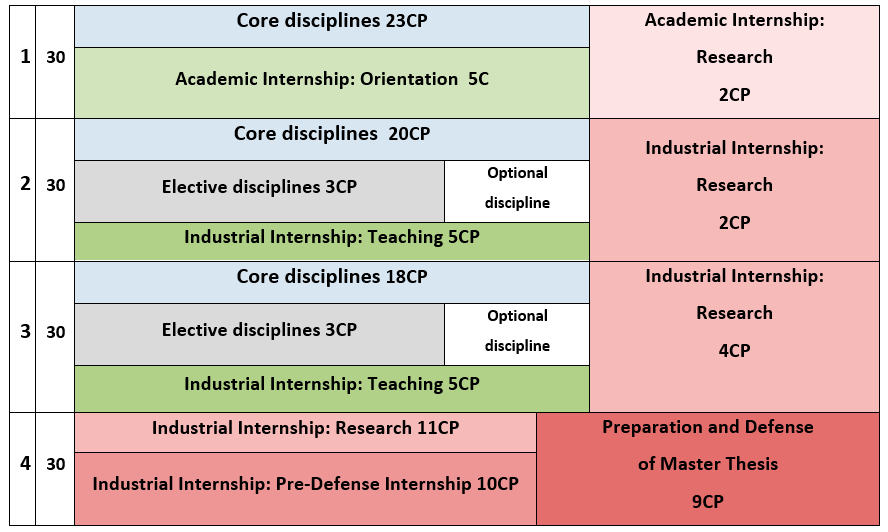
Total 120 CP
- Admission starts on June 20
- Admission stops on July 10
- The documents are sent to the university in electronic form through the Enrolee NSTU Personal Account. When submitting an application for admission in electronic form, the documents attached to it are submitted (sent) to the NSTU admission committee in the form of their electronic images (paper documents converted into electronic form by scanning or photographing with the provision of machine-readable recognition of its details)
- Entrance tests to the master's program are in the form of an interdisciplinary online test. The disciplines to be tested are Pedagogy, Psychology and English for Specific Purposes in Foreign Language Teaching.
